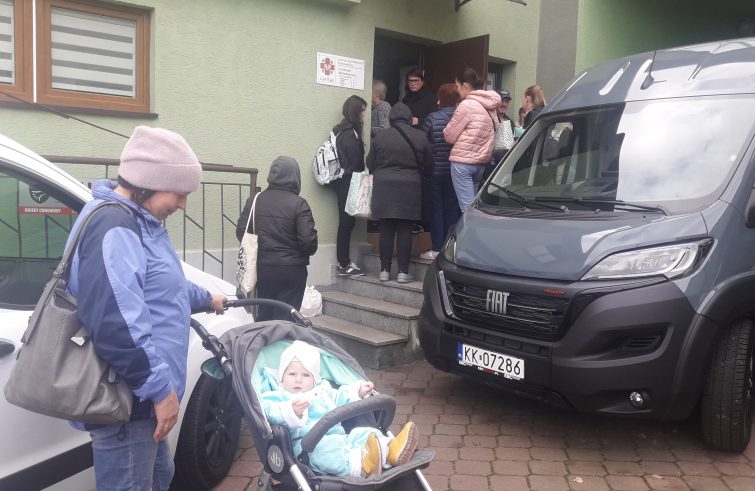
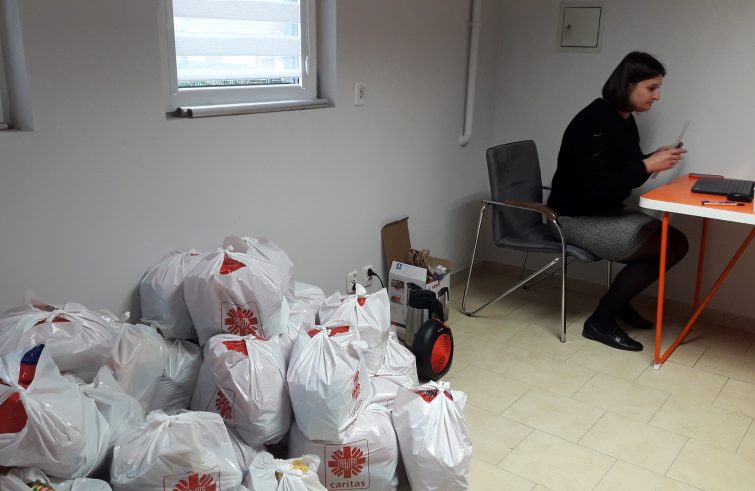 “No free places, all our centres are full”. Julia Danishevska is Ukrainian though she has lived in Krakow for the past seven years. She runs one of the Caritas centres in the Polish city. This is the day when voluntary workers distribute food and hygiene packages. Only women with children, in fact very small children, are standing in line. The men are unloading the parcels from the trucks, but they are Polish. The women are bundled up in winter coats or tucked in the hoods of their jumpers. The weather is cold even though it’s still autumn. Children are waving, smiling, they want to make friends and play. A woman swiftly raises her gaze and immediately looks down again. An instant, enough to catch a glimpse of her weary, half-lidded eyes. Months away from home have started to take their toll. The director of Caritas Krakow, Fr Tomasz Stec, describes the psychological and emotional condition facing Ukrainian refugees today: “It’s very hard for them. Moving to another country is a challenge which they cannot cope with alone, neither financially nor from a psychological angle.”
“No free places, all our centres are full”. Julia Danishevska is Ukrainian though she has lived in Krakow for the past seven years. She runs one of the Caritas centres in the Polish city. This is the day when voluntary workers distribute food and hygiene packages. Only women with children, in fact very small children, are standing in line. The men are unloading the parcels from the trucks, but they are Polish. The women are bundled up in winter coats or tucked in the hoods of their jumpers. The weather is cold even though it’s still autumn. Children are waving, smiling, they want to make friends and play. A woman swiftly raises her gaze and immediately looks down again. An instant, enough to catch a glimpse of her weary, half-lidded eyes. Months away from home have started to take their toll. The director of Caritas Krakow, Fr Tomasz Stec, describes the psychological and emotional condition facing Ukrainian refugees today: “It’s very hard for them. Moving to another country is a challenge which they cannot cope with alone, neither financially nor from a psychological angle.”
“The war left a huge number of people traumatised – they were separated from their loved ones. Most of them had to leave their families behind. We are trying our best to help them cope with this new situation and to adapt to their new situation here in Poland.”
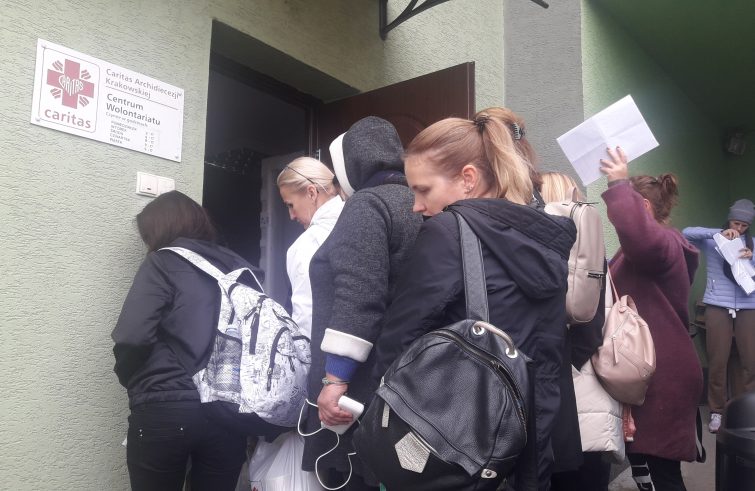 The situation is not going to get any better, at least not in the short term. In fact, the Caritas workers here in Krakow believe that it will only get worse. Alarming news is being reported from Ukraine. Attacks are increasing all over the country. Air raid alerts sound every day with the authorities urging people to stay in the shelters.
The situation is not going to get any better, at least not in the short term. In fact, the Caritas workers here in Krakow believe that it will only get worse. Alarming news is being reported from Ukraine. Attacks are increasing all over the country. Air raid alerts sound every day with the authorities urging people to stay in the shelters.
In these conditions it’s hard to make any forecasts or provide any data or statistical information. But one thing is certain: “we have seen an increase in the number of people calling our emergency number in the last few weeks,” says Julia, “and finding accommodation for applicants is now a problem.
Caritas has been providing accommodation and hospitality to all those who knock on its doors since the outbreak of hostilities. Three centres were thus set up for the distribution of humanitarian relief aid (one of them is located at the main railway station). In addition, Caritas is helping people to find a place to stay and in September alone, it managed to accommodate around 300 people, partly through the religious houses and the parish network.
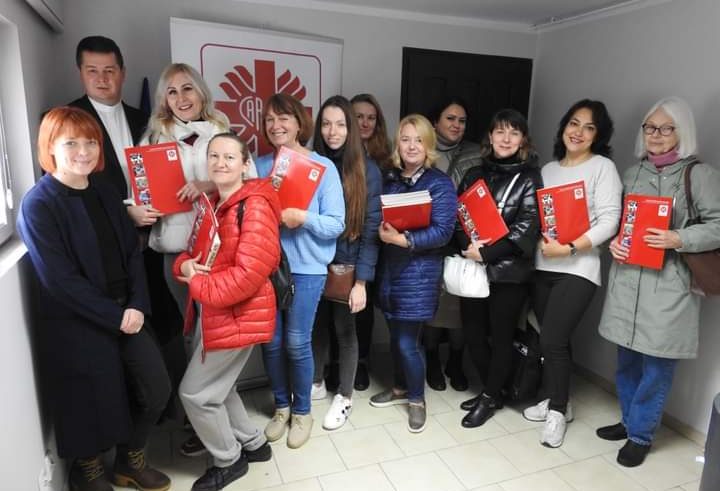 But war is not the only factor that drives people to flee. A very cold winter is forecast to hit a country whose population is struggling with power and heating shortages. And many of those who arrived here expecting a swift return don’t know if their homes have been completely destroyed and need to be rebuilt. In short, long-term migrations are very likely and the way back to Ukraine, even from Krakow, still seems a long way off. However, Caritas braced for this scenario. It launched Polish language courses, with classes organised according to age group. And while children have already started school, blending in with Polish children, teenagers and older youths often prefer to follow online classes from Ukraine.
But war is not the only factor that drives people to flee. A very cold winter is forecast to hit a country whose population is struggling with power and heating shortages. And many of those who arrived here expecting a swift return don’t know if their homes have been completely destroyed and need to be rebuilt. In short, long-term migrations are very likely and the way back to Ukraine, even from Krakow, still seems a long way off. However, Caritas braced for this scenario. It launched Polish language courses, with classes organised according to age group. And while children have already started school, blending in with Polish children, teenagers and older youths often prefer to follow online classes from Ukraine.
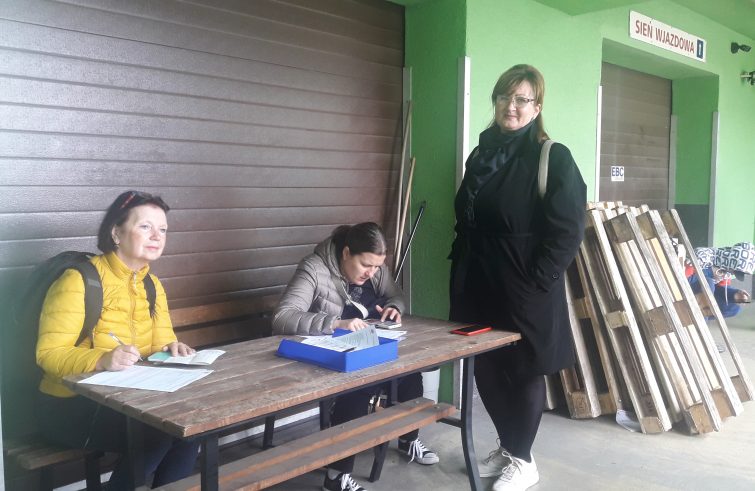 On a population of 700,000, the city of Krakow has taken in 200,000 Ukrainian refugees. Rental prices have increased, coupled by a severe housing crisis. In the Caritas centres, people are asked to fill out a form detailing their needs. Most of them are mothers with children, women and families who ran out of financial resources. Some even arrived barefoot in the hurry to flee. Many stories from war-torn Ukraine are intertwined with those of the Polish aid workers. Julia recalled the story of a family from Mariupol who stayed in the basement of a shelter for more than a month. Then the Russians arrived and they travelled a very long way to get to Poland, via Moscow, St Petersburg, Lithuania. “They even drank the water they found in the radiators. They arrived, but they lost everything.
On a population of 700,000, the city of Krakow has taken in 200,000 Ukrainian refugees. Rental prices have increased, coupled by a severe housing crisis. In the Caritas centres, people are asked to fill out a form detailing their needs. Most of them are mothers with children, women and families who ran out of financial resources. Some even arrived barefoot in the hurry to flee. Many stories from war-torn Ukraine are intertwined with those of the Polish aid workers. Julia recalled the story of a family from Mariupol who stayed in the basement of a shelter for more than a month. Then the Russians arrived and they travelled a very long way to get to Poland, via Moscow, St Petersburg, Lithuania. “They even drank the water they found in the radiators. They arrived, but they lost everything.
“The first question they ask is: where do we start from now?”
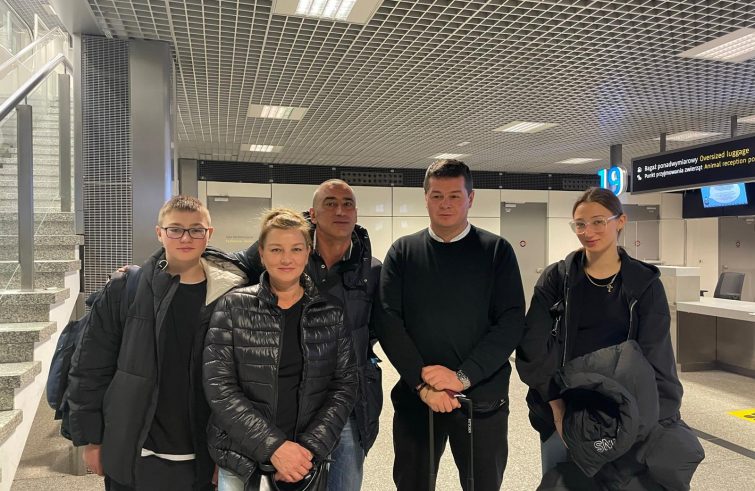 Thanks to Caritas Southwark (London), the family from Mariupol managed to make it to England where both parents found a job and the children are going to school. “We workers are tired too,” Julia confesses. “But the moment we realise that these people are in serious need, their cry for help fills us with new energy.” “I witnessed extreme poverty and human suffering – adds Fr Stec – but I also saw tremendous humanitarian support and empathy. Once again in my life, I had the experience that goodness is more powerful than evil.” What message would you like to convey to people in Italy? The Caritas director replies:
Thanks to Caritas Southwark (London), the family from Mariupol managed to make it to England where both parents found a job and the children are going to school. “We workers are tired too,” Julia confesses. “But the moment we realise that these people are in serious need, their cry for help fills us with new energy.” “I witnessed extreme poverty and human suffering – adds Fr Stec – but I also saw tremendous humanitarian support and empathy. Once again in my life, I had the experience that goodness is more powerful than evil.” What message would you like to convey to people in Italy? The Caritas director replies:
“We must not get used to or remain indifferent to this situation. No matter whether what we do is appreciated; no matter if everyone deserves it… Our vocation is bear witness through acts of mercy. And Mercy is the name of God.”









